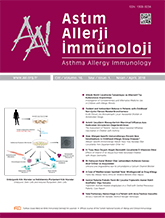


Objective: Seasonal influenza vaccination is recommended for asthmatic patients who have a risk of severe influenza infection. We aimed to evaluate the parents` opinion about flu vaccination in their children with asthma and also to investigate the factors influencing the decision to accept the vaccination.
Materials and Methods: Asthmatic and healthy children, aged 6-18 years, who had presented to the Pediatric Allergy Outpatient Clinic at Denizli State Hospital between December 2016 and February 2017 were enrolled. A questionnaire querying demographic information, house conditions and parents` opinion about the flu vaccine was given to the parents. The factors influencing the decision to accept the vaccination were investigated by logistic regression analysis.
Results: A total of 214 asthmatic and 39 healthy children were analyzed. The distribution of age and gender, frequency of upper respiratory infection, demographics of the parents and house conditions were similar. The rate of seasonal influenza vaccination was similar between asthmatic (25.4%) and healthy (15.4%) children in the 2016-2017 season (p=0.179). We found that 49% of the parents believed that the vaccine protects from severe influenza infection, 35% thought the vaccine might prevent asthma exacerbations, 10% believed the vaccine has no benefits, and 7% believed it has a high rate of adverse effects. Of 41-65% have no idea about flu vaccine. The most common reason for accepting vaccination was physician advice. However, 26.5% regretted accepting the vaccination despite the physician`s recommendation. The age at initial symptoms was significantly lower and the vaccination rate in the previous season higher in the asthmatic children. The probability of flu vaccination was increased by 6.4 times (95% CI: 1.55-27.59, p=0.011) in children regularly using medicine for asthma and 2.7 times (95% CI: 1.20-6.02, p=0.016) in those under regular follow-up by an pediatric allergist.
Conclusion: Our results showed that the seasonal influenza vaccination rate was similar between asthmatic and healthy children, and there was a lack of knowledge about vaccination in the parents of asthmatics. This study suggests that the most important factors for increasing the vaccination rate are physician advice, and being under treatment and regular follow-up.